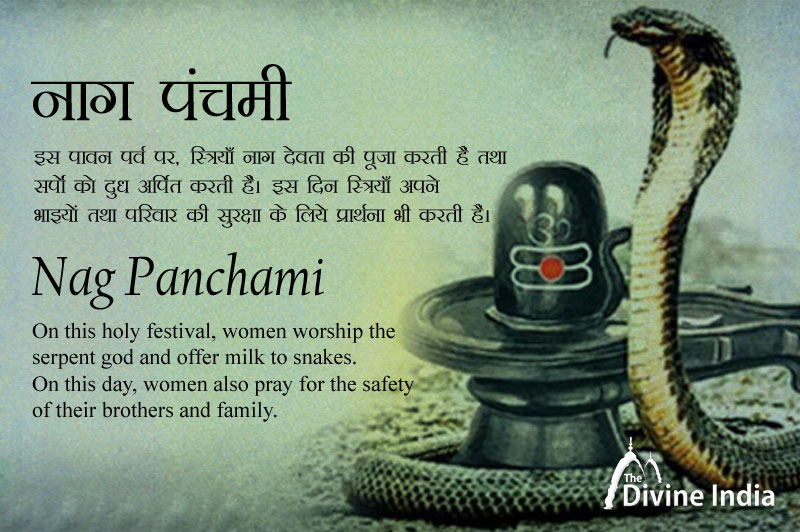


Panchami of Shukla Paksha of Shravan month is known as Nag Panchami. Snakes are worshiped on this day. On this day, snakes are fed with milk. On this holy festival, women worship the serpent god and offer milk to snakes. On this day, women also pray for the safety of their brothers and family. It has been suggested in the Garuda Purana that on the day of Nagpanchami, the idol of Nag should be worshiped on both sides of the house. According to astrology, the lord of Panchami Tithi is Nag. That is, Panchami should be worshiped in Sheshnag etc.
In Hindu mythology, serpents hold a prominent role. They are often associated with divine deities and have both protective and destructive attributes. Snakes are revered as symbols of power, transformation, and rebirth. Nag Panchami commemorates the veneration of these serpent deities.
Nag Panchami is observed on the fifth day (Panchami) of the bright fortnight (Shukla Paksha) in the Hindu month of Shravana (July-August). On this day, believers pay homage to serpent deities through various rituals. Images or pictures of snakes are drawn on walls using a mixture of cow dung and water, and they are adorned with flowers and vermillion.
Devotees visit temples dedicated to serpent deities, especially the snake god, Lord Shiva. They offer milk, sweets, flowers, and other traditional offerings to appease and seek blessings from these divine beings. It is believed that observing Nag Panchami with sincerity can protect one from snakebites and other serpent-related troubles.
Beyond its literal significance, Nag Panchami carries symbolic and spiritual undertones. Snakes are often associated with hidden energies and the dormant kundalini energy within human beings. The festival encourages believers to awaken their inner energies, foster transformation, and seek spiritual enlightenment.
Nag Panchami is celebrated with varying customs across different regions of India. In some places, people place milk or rice near anthills, as they are believed to be abodes of serpents. In others, they craft clay idols of snakes and worship them.
Nag Panchami also serves as a reminder of the importance of respecting and preserving nature and its creatures. Snakes play a crucial role in maintaining ecological balance by controlling rodent populations. The festival encourages a harmonious relationship between humans and the natural world.
Nag Panchami reflects the diverse cultural and religious fabric of India. It transcends regional and linguistic boundaries, uniting people in their reverence for serpents and their spiritual beliefs.
Nag Panchami is more than a ritualistic observance; it's a celebration of nature, spirituality, and cultural heritage. By honoring the serpent deities, believers not only seek their blessings but also embrace the symbolism of transformation and spiritual awakening. The festival resonates with the larger philosophy of interconnectedness and reverence for all life forms, contributing to the rich tapestry of India's cultural mosaic.
Many stories are prevalent in ancient stories. One of them is as follows - A farmer lived in a state. The farmer had two sons and a daughter. One day, three snake children crushed and died while running the plow. The serpent kept mourning at first and then went to take revenge on the murderer of the child. In the night, the serpent bites the farmer, his wife and both boys. The next day the serpent arrived to bite the daughter of the farmer, the daughter of the farmer placed a bowl full of milk in front of the serpent and folded his hands and started apologizing. The serpent delighted, raising her parents and both brothers alive. That day was Shravan Shukla Panchami. Since then serpents are worshiped on this day to avoid the wrath of the serpent.
Nag Panchami is a Hindu festival dedicated to serpents. It is observed on the fifth day of the bright fortnight in the Hindu month of Shravana, which usually falls in July or August.
Nag Panchami symbolizes the awakening of inner energies, transformation, and spiritual enlightenment. Snakes are also associated with the dormant kundalini energy within human beings.
Nag Panchami on Monday, 17 July 2026.